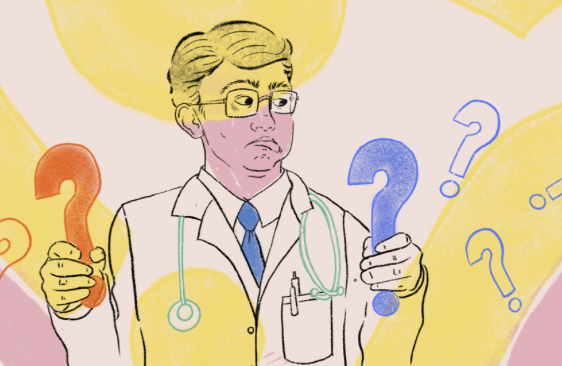Do I Have Anxiety or OCD?
 Anxiety and Obsessive-Compulsive Disorder (OCD) are two mental health conditions that can often be confused with one another. This confusion is not uncommon, especially when it comes to diagnoses made by therapists who may not specialize in these specific disorders. In this blog post, we will dive into the differences between anxiety and OCD, explore why they are commonly misdiagnosed by untrained therapists, and discuss the importance of seeking help from specialized professionals for accurate diagnosis and effective treatment.
Anxiety and Obsessive-Compulsive Disorder (OCD) are two mental health conditions that can often be confused with one another. This confusion is not uncommon, especially when it comes to diagnoses made by therapists who may not specialize in these specific disorders. In this blog post, we will dive into the differences between anxiety and OCD, explore why they are commonly misdiagnosed by untrained therapists, and discuss the importance of seeking help from specialized professionals for accurate diagnosis and effective treatment.
Understanding Anxiety vs. OCD
Anxiety is a common emotion experienced by many people in response to stress or fear-inducing situations. It can manifest as feelings of worry, nervousness, or unease. On the other hand, OCD is a mental health disorder characterized by intrusive thoughts (obsessions) and repetitive behaviors (compulsions) aimed at alleviating anxiety or preventing perceived harm.
The Misdiagnosis Conundrum
The misdiagnosis of OCD as generalized anxiety disorder can have significant implications for patients. Therapists who are not specialized in anxiety and OCD may inadvertently overlook key symptoms that differentiate the two disorders. This misunderstanding can lead to incorrect treatment plans that do not effectively address the core issues faced by individuals with OCD.
One reason for this misdiagnosis is the overlap in symptoms between anxiety and OCD. For example, individuals with both conditions may experience heightened levels of anxiety and panic attacks; however, the source and nature of this anxiety differ significantly. Without proper training and expertise in distinguishing between these disorders, therapists may struggle to provide accurate diagnoses.
Another factor contributing to misdiagnosis is the stigma surrounding mental health conditions like OCD. Some therapists may be more familiar with treating anxiety disorders and may default to diagnosing patients with generalized anxiety disorder due to its prevalence compared to OCD.
Also, if your therapist doesn’t specialize in OCD, they may not understand that some compulsions are not physical in nature, but mental, so they are less obvious, thus, a diagnosis of OCD can be missed.
The Role of Specialized Therapists
Seeking help from specialized therapists who have extensive experience in treating anxiety and OCD is crucial for accurate diagnosis and effective treatment. These professionals possess the knowledge and skills necessary to differentiate between various mental health conditions, including recognizing the specific symptoms unique to OCD.
Specialized therapists can conduct thorough assessments that take into account the nuances of each disorder, ensuring that patients receive tailored treatment plans that target their individual needs. By addressing the root causes of OCD through evidence-based therapies such as Exposure Response Prevention (ERP), specialized therapists can help patients manage their symptoms effectively.
In addition to providing specialized care, these therapists offer a supportive environment where individuals feel understood and validated in their experiences with OCD. This validation plays a vital role in promoting healing and recovery among patients struggling with this challenging disorder.
The Benefits of Proper Diagnosis
When individuals receive an accurate diagnosis of OCD instead of being misclassified as having generalized anxiety disorder, they gain access to targeted treatments that have been proven effective for managing obsessive thoughts and compulsive behaviors – such as ERP. By working with a specialized therapist who understands the intricacies of OCD, patients can experience shorter treatment durations and improved outcomes compared to generalized approaches that do not address their specific needs.
Moreover, proper diagnosis leads to increased awareness and education about OCD within both therapeutic settings and society at large. By shedding light on the distinct features of this disorder and dispelling misconceptions surrounding it, individuals living with OCD can feel empowered to seek help without fear of being misunderstood or mislabeled.
In Conclusion
In conclusion, differentiating between anxiety and Obsessive-Compulsive Disorder is essential for providing appropriate care to individuals experiencing these conditions. While well-meaning therapists may inadvertently misdiagnose OCD as generalized anxiety disorder due to overlapping symptoms or lack of specialization, seeking help from specialized professionals can lead to more accurate diagnoses and tailored treatment plans.
By advocating for comprehensive assessments conducted by therapists knowledgeable about anxiety and OCD, patients can navigate their mental health journeys with confidence knowing they are receiving the support they need. Remember: your mental health matters, so don’t hesitate to seek out qualified professionals who can guide you towards healing and recovery.
At GroundWork, in Orlando we’re proud to offer truly specialized care for those struggling with anxiety, and OCD and our therapists are experienced at accurate assessment and diagnosis so that therapy and treatment can be targeted effectively, helping you get better, faster.
Ready To Make A Change?
GroundWork is proud to offer both in-person &
virtual Telehealth appointments.
In-Person Sessions: Central Florida
Virtual Sessions: Florida, Maine, South Carolina, Montana, Vermont




















